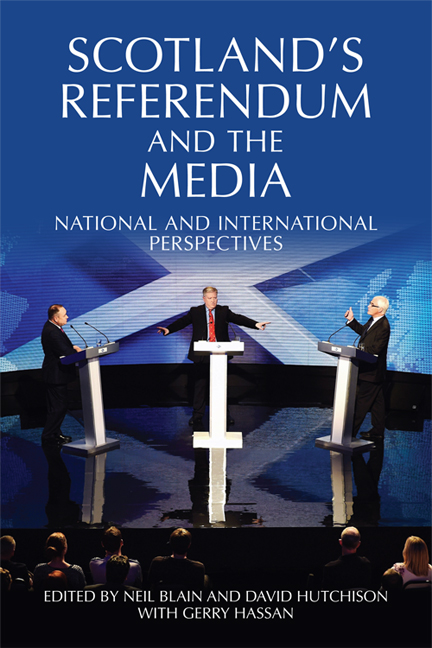Book contents
- Frontmatter
- Contents
- Preface
- Part One The Referendum in Scotland
- Part Two Views from the UK
- Part Three International Perspectives
- 13 ‘Knock-on Consequences’: Irish Media Coverage of the Scottish Referendum
- 14 Spain, Catalonia and the Scottish Referendum: A Study in Multiple Realities
- 15 The French View
- 16 The Scottish Referendum in Austrian, German and Swiss Media
- 17 The Scottish Referendum: The View from Quebec
- 18 The Scotland Referendum in the English-language Canadian Media
- 19 Australia and the Scottish Independence Referendum
- 20 Afterword: Reimagining Scotland in a New Political Landscape
- Notes on the Contributors
- Index
16 - The Scottish Referendum in Austrian, German and Swiss Media
from Part Three - International Perspectives
Published online by Cambridge University Press: 05 August 2016
- Frontmatter
- Contents
- Preface
- Part One The Referendum in Scotland
- Part Two Views from the UK
- Part Three International Perspectives
- 13 ‘Knock-on Consequences’: Irish Media Coverage of the Scottish Referendum
- 14 Spain, Catalonia and the Scottish Referendum: A Study in Multiple Realities
- 15 The French View
- 16 The Scottish Referendum in Austrian, German and Swiss Media
- 17 The Scottish Referendum: The View from Quebec
- 18 The Scotland Referendum in the English-language Canadian Media
- 19 Australia and the Scottish Independence Referendum
- 20 Afterword: Reimagining Scotland in a New Political Landscape
- Notes on the Contributors
- Index
Summary
‘Story’ is a term often used in journalism, but here it is employed in the context of narratology, where story-telling is a cognitive schema, that is, the most basic human ability of making sense of life, giving meaning to it, and passing this understanding intelligibly on to others. This is a fundamental faculty of the human mind. In this context, the stories told about Scotland and the referendum in different media in three important European countries where German is spoken have been investigated: Austria, Germany, and Switzerland. A fairly comprehensive and representative number of newspapers, illustrated magazines, TV, and radio stations have been scrutinised and have provided an impressive amount of material (see Tables 16.1 and 16.2 at the end of the chapter). The topics dealt with in this article have evolved out of this material, rather than been forced on to it, as it quickly became evident that there is a great deal of similarity in what is presented in texts on Scotland, discussed in the first part of the chapter. The chapter will then discuss the differences in these stories and their causes, and then present the conclusions drawn in the media themselves and those developing out of this investigation.
The Basic Story and Other Key Story Elements
The simplest way of telling a story is to speak about what happened and use the structure E. M. Forster employed for his definition of ‘story’ in Aspects of the Novel: ‘and then, and then’. This creates a chronology of events, which in connection with the referendum and the media investigated has roughly this shape: (1) the September referendum, (2) a fairly certain majority for No, (3) the possibility of a Yes victory, (4) (producing) an increase of political threats, economic warnings, and eventually the Prime Minister's, Labour's and Liberals’ ‘Vow’, (5) the referendum result, (6) the first impression that the independence question is settled for at least one generation, (7) Salmond (therefore) stepping down, (8) Cameron's demand for English votes for English laws, (9) (producing) huge new problems and consequences, (10) (so that eventually) nothing has been settled.
These key events in the Scottish referendum story found in the media investigated create a storyline and also contain elements that surfaced in all of the stages mentioned, such as the warnings of an economic disaster in the case of independence.
- Type
- Chapter
- Information
- Scotland's Referendum and the MediaNational and International Perspectives, pp. 182 - 194Publisher: Edinburgh University PressPrint publication year: 2016



